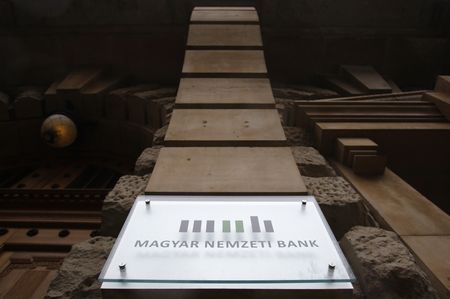By Gergely Szakacs
BUDAPEST (Reuters) – Hungary’s central bank is likely to leave its base rate unchanged at 13% next Tuesday, the highest in the European Union, amid a continued rise in inflation now seen at 18.7% next year, more than four percentage points above 2022 levels.
All 17 economists in a Dec. 12-16 survey said the National Bank of Hungary (NBH), which launched a new quick deposit tool at an 18% interest rate in mid-October to shore up the forint, would leave its base rate unchanged next week.
The NBH will also unveil new economic forecasts on Tuesday, which Governor Gyorgy Matolcsy said would show inflation running at 15% to 18% next year.
Inflationary pressures were since compounded after Prime Minister Viktor Orban, under pressure from a supply shortage, scrapped a year-long cap on retail fuel prices.
Economists polled by Reuters see 2023 average inflation at 18.7%, 410 basis points higher than this year, which would be the highest in the EU by far based on the European Commission’s latest economic forecasts.
After a 5% expansion estimated for 2022, economic growth is seen grinding to a halt next year, with a 2.5% recovery projected a year later.
“We now expect inflation to peak at 25%oya (year-on-year) in December,” economists at JP Morgan said in a note. “What happens next is extremely uncertain.”
“The Hungary-specific uncertainty comes from the currency, which is likely to weaken on trend due to a large external financing gap, but could do so aggressively if markets were to lose trust in authorities’ ability to rebalance the economy.”
The forint, central Europe’s worst-performing unit with a 9% loss versus the euro this year, regained some ground after Hungary secured a last-minute deal with the EU to stave off the loss of recovery funding, averting a hit to its currency and bonds.
However, funds are not expected to start flowing until next April, while a surge in Hungary’s energy import bills amid the war in neighbouring Ukraine will put additional pressure on Hungary’s finances.
“We expect the (NBH) to maintain its policy stance, keeping the effective policy rate at 18% until end-1Q23,” Societe Generale economist Marek Drimal said.
“All in all, we believe that the risk environment will not improve sufficiently for the (NBH) to scale back tightening before end-1Q23.”
Economists see average inflation running at 4.8% in 2024, which would mean the NBH missing its 2% to 4% policy target range for the fourth year in a row.
(Reporting by Gergely Szakacs; Editing by Emelia Sithole-Matarise)

